De Nederlandse dichteres Petra Else Jekel werd in Arnhem geboren op 5 mei 1980. Zie ook alle tags voor Petra Else Jekel op dit blog.
De tweelingvrouw
1
de tweelingvrouw, de twee Frida’s
zij hebben slechts één paar voeten
haar duimen raken alle vingers
stuk voor stuk en heen en terug
als in die eerste dansles waarin
zij een cirkel van haar hand en
arm omheen haar buik maakt
de tweelingvrouw, de twee Frida’s
houden de duimen aan de borst
zij raken onder water aan elkaar
het bodemsteen naar hen geslepen
biedt als huis een grot met genoeg
onderwatergewaden om te blijven
nog net verandert zij van lichaam
2
de eerste Frida roept mij bij zich
zij roept me over water vanuit zee
maar op de wal laat ze me staan
ik zet me neer en wacht op regen
de tweede Frida praat heel zachtjes
zegt wat niet waar is aan het water
dat ik helder moet zijn van woorden
als ik geluisterd heb neemt zij me mee
neem een sjaal zegt zij, het zal er waaien
breng een jas tegen het water, vergeet
hoe te zwemmen, adem ook onder water
door, wees als het levend bloedkoraal
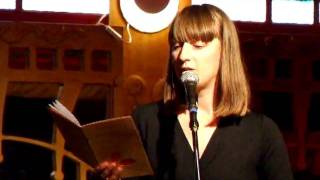
Petra Else Jekel (Arnhem, 5 mei 1980)
De Hongaarse dichter en schrijver Miklós Radnóti werd geboren op 5 mei 1909 in Boedapest. Zie ook alle tags voor Miklós Radnóti op dit blog.
Forced March
Crazy, who, from collapsing, gets up for new advance,
and moves in stumbling torture the limbs to get his chance,
and still is heading forward as if with wings he’d fly,
in vain the trench is calling, he does not dare to die.
He’d answer to your question, what for this strain’s to stand,
that there’s a dear wife waiting, and perhaps a wiser end.
Yet this good guy’s quite crazy, through his old home behind
since long the winds are blowing, from blaze and ashes blind.
The back wall fell to pieces, the plum tree’s broken down,
and gotten rough from scaring those nights so sweet at home.
Oh, couldn’t I believe yet – not kept in heart alone –
that there is still a homeland, so dear for me to roam;
if there were still the old porch, and sitting in the sun,
and peaceful bees were humming while cools the jelly plum,
the ending summer dozing o’er the garden’s dreamy flair,
and midst green foliage swaying the fruit so firm and bare,
and Fanni stands there waiting, blonde, the hawthorn hedge aside,
and shadows written slowly by a slow late morning’s light. –
Could all this still come true yet! The moon’s so round today!
Don’t stride ahead, my comrade, shout at me – I can’t stay!
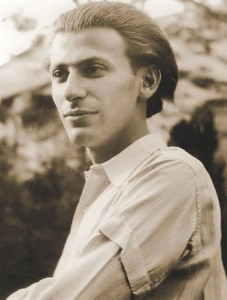
Miklós Radnóti (5 mei 1909 – 9 november 1944)
De Amerikaanse schrijver Morton Rhue (pseudoniem van Todd Strasser) werd geboren op 5 mei 1950 in New York. Zie ook alle tags voor Morton Rhue op dit blog.
Uit: Die Welle (Vertaald door Hans-Georg Noack)
“David saß wartend auf dem Beifahrersitz in Brians Wagen. Sie parkten in der Nähe der Tennisplätze, die auch während der Nacht in Betrieb waren, denn David wusste, dass Laurie immer diesen Weg wählte, wenn sie nach Anbruch der Dunkelheit nach Hause ging. Die hellen Lichter von den Tennisplätzen gaben ihr ein Gefühl der Sicherheit.
Seit fast einer Stunde saßen sie jetzt im Auto. Brian saß auf dem Fahrersitz und hielt im Rückspiegel nach Laurie Ausschau. Dabei pfiff er eine Melodie, die David nicht erkannte, weil Brian falsch pfiff. David sah den Tennisspielern zu und lauschte auf das monotone Geräusch der hin und her geschlagenen Bälle.
„Brian, darf ich dich etwas fragen?“, sagte er nach langem Schweigen.
„Was denn?“
„Was pfeifst du da eigentlich?“
Brian schien überrascht zu sein.
„Take me out to the ball game“, sagte er. Dann pfiff er noch ein paar Takte, das Lied blieb völlig unkenntlich. „ Erkennst du es jetzt?“ David nickte. „Ja, sicher, Brian, sicher“. Er sah wieder den Tennisspielern zu. Einen Augenblick später richtete Brian sich auf. David wandte sich um und schaute die Straße hinunter. Laurie kam auf dem Fußweg sehr schnell näher. Er griff zur Tür. „Gut, und jetzt lass mich die Sache allein erledigen“, sagte er.
„Solange sie vernünftig ist“, antwortete Brian. „Aber wir spielen jetzt nicht mehr“.
„Sicher, Brian“, erwiderte David und stieg aus dem Wagen. Jetzt klang Brian schon ebenso wie Robert.
Er musste schnell laufen, um Laurie einzuholen, und er war sich die ganze Zeit nicht im Klaren darüber, wie er die Sache anpacken sollte. Er wusste nur, dass er es besser machen konnte als Brian. Er holte sie ein, aber Laurie blieb nicht stehen, und er musste schnell gehen, um mit ihr Schritt zu halten.”

Morton Rhue / Todd Strasser (New York, 5 mei 1950)
De Amerikaanse dichter, schrijver en journalist Christopher Morley werd geboren op 5 mei1890 in Haverford, Pennsylvania. Zie ook alle tags voor Christopher Morley op dit blog.
Reading Aloud
ONCE we read Tennyson aloud
In our great fireside chair;
Between the lines my lips could touch
Her April-scented hair.
How very fond I was, to think
The printed poems fair,
When close within my arms I held
A living lyric there!
Smells
WHY is it that the poet tells
So little of the sense of smell?
These are the odors I love well:
The smell of coffee freshly ground;
Or rich plum pudding, holly crowned;
Or onions fried and deeply browned.
The fragrance of a fumy pipe;
The smell of apples, newly ripe;
And printer’s ink on leaden type.
Woods by moonlight in September
Breathe most sweet, and I remember
Many a smoky camp-fire ember.
Camphor, turpentine, and tea,
The balsam of a Christmas tree,
These are whiffs of gramarye. . .
A ship smells best of all to me!
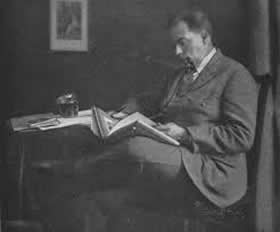
Christopher Morley (5 mei 1890 – 28 maart 1957)
De Franse dichter, schilder en criticus George Albert Aurier werd geboren op 5 mei 1865 in Châteauroux. Zie ook alle tags voor George Albert Aurier op dit blog.
Uit: Le Symbolisme en peinture – Paul Gauguin
« Aujourd’hui qu’en littérature nous assistons – cela commence à devenir évident – à l’agonie du naturalisme, alors que nous voyons se préparer une réaction idéaliste, mystique même, il faudrait s’étonner si les arts plastiques ne manifestaient aucune tendance vers une pareille évolution. La Lutte de Jacob avec l’Ange, que j’ai tenté de décrire en exorde de cette étude, témoigne assez, je crois, que cette tendance existe, et l’on doit comprendre que les peintres engagés dans cette voie nouvelle ont tout intérêt à ce qu’on les débarrasse de cette absurde étiquette d’« impressionnistes », qui implique, il faut le répéter, un programme directement contradictoire du leur. Cette petite discussion sur les mots, ridicule peut-être en apparence, était pourtant, j’estime, nécessaire : le public, suprême juge en matière d’art, ayant l’incurable habitude, qui ne le sait? de ne juger les choses que sur leurs noms. Donc, qu’on invente un nouveau vocable en « -iste » (il y en a tant déjà qu’il n’y paraîtra point !) pour les nouveaux venus, à la tête desquels marche Gauguin : synthétistes, idéistes, symbolistes, comme il plaira, mais surtout qu’on renonce à cette inepte appellation générale d’impressionnistes, et qu’on réserve strictement ce titre aux peintres pour lesquels l’art n’est qu’une traduction des sensations et des impressions de l’artiste. »
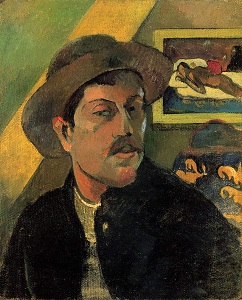
George Albert Aurier (5 mei 1865 – 5 oktober 1892)
Paul Gauguin, zelfportret, 1893
De Poolse schrijver en journalist Henryk Sienkiewicz werd geboren in Wola Okrzejska op 5 mei 1846. Zie ook alle tags voor Henryk Sienkiewicz op dit blog.
Uit: With Fire and Sword (Vertaaald door W. S. Kuniczak)
“THE YEAR 1647 was that wonderful year in which manifold signs in the heavens and on the earth announced misfortunes of some kind and unusual events. Contemporary chroniclers relate that beginning with spring−time myriads of locusts swarmed from the Wilderness, destroying the grain and the grass; this was a forerunner of Tartar raids. In the summer there was a great eclipse of the sun, and soon after a comet appeared in the sky. In Warsaw a tomb was seen over the city, and a fiery cross in the clouds; fasts were held and alms given, for some men declared that a plague would come on the land and destroy the people. Finally, so mild a winter set in, that the oldest inhabitants could not remember the like of it. In the southern provinces ice did not confine the rivers, which, swollen by the daily melting of snows, left their courses and flooded the banks.
Rainfalls were frequent. The steppe was drenched, and became an immense slough. The sun was so warm in the south that, wonder of wonders! in Bratslav and the Wilderness a green fleece covered the steppes and plains in the middle of December. The swarms in the beehives began to buzz and bustle; cattle were bellowing in the fields. Since such an order of things appeared altogether unnatural, all men in Russia who were waiting or looking for unusual events turned their excited minds and eyes especially to the Wilderness, from which rather than anywhere else danger might show itself.
At that time there was nothing unusual in the Wilderness,—no struggles there, nor encounters, beyond those of ordinary occurrence, and known only to the eagles, hawks, ravens, and beasts of the plain. For the Wilderness was of this character at that period. The last traces of settled life ended on the way to the sooth, at no great distance beyond Chigirin on the side of the Dnieper, and on the side of the Dniester not far from Uman; then forward to the bays and sea there was nothing but steppe after steppe, hemmed in by the two rivers as by a frame. At the bend of the Dnieper in the lower country beyond the Cataracts Cossack life was seething, but in the open plains no man dwelt; only along the shores were nestled here and there little fields, like islands in the sea. The land belonged in name to Poland, but it was an empty land, in which the Commonwealth permitted the Tartars to graze their herds; but since the Cossacks prevented this frequently, the field of pasture was a field of battle too.”
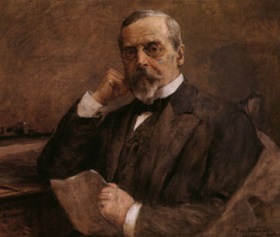
Henryk Sienkiewicz (5 mei 1846 – 15 november 1916)
Laatste portret door Kazimierza Pochwalskiego, 1915
Zie voor nog meer schrijvers van de 5e mei ook mijn blog van 5 mei 2013 deel 2.
